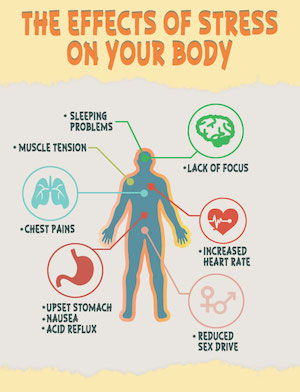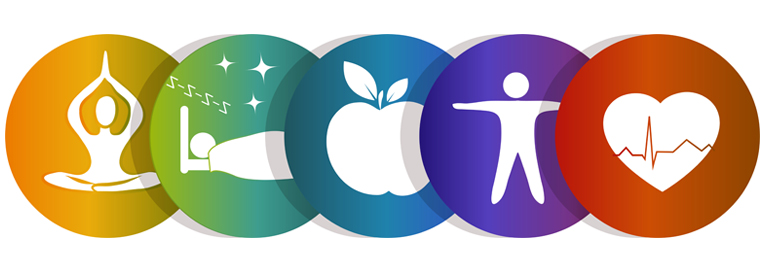Stress: Effects on your Body and Mind
Stress (Physical or Mental) can affect your health on long term. Many times, you may not realize it.
Stress symptoms can affect your body, thoughts, feelings and behaviour. Once you recognize common stress symptoms, it can help you to manage them effectively. Unrecognised stress can contribute to many health problems, such as high blood pressure, heart disease, obesity and diabetes.
Common effects of stress on your body:
- Headache
- Leg pain or Body pain
- Chest pain
- Fatigue without any exertion or minimal efforts
- Decrease in sexual desire
- Stomach or Gastric problems
- Sleep related problems

Common effects of stress on your mood & behaviour:
- Lack of zeal or loss of interest in daily routine
- Anxiety, unnecessary fear
- Increased Irritability or anger
- Feeling of Sadness or depression
- Change in food intake (Overeating or loss of appetite)
- Angry outbursts
- Drug or alcohol abuse
- Tobacco use
- Social withdrawal
- Loss of interest from your favorite activities/hobbies
How to manage stress?
It’s better to find active ways to manage your stress which provide freshness to your mind and body.

- Physical exercise – Do regular physical activity - participate in sports or aerobic exercise like walking or cycling or swimming
- Mental Relaxation techniques- Deep breathing (Pranayam), meditation or yoga
- Socializing with family and friends
- Spare time for hobbies such as reading a book or listening to music
Passive ways or options — such as watching television, surfing the Internet or playing video games — looks relaxing, but they can be addictive and increase your stress over the long term.
Get adequate sleep (6-8 hours) at night and eat a healthy, balanced diet. Excessive spice or sugar in diet can affect your mood adversely. Avoid tobacco, ecstatic drugs, excess caffeine or alcohol intake.
When to seek expert help?
- Red Flag or Warning signs – Consult a doctor immediately if you have any stress symptom(s) which are alarming. Few examples – (a) Headache with vomiting or vision disturbance, (b) Chest pain with breathing discomfort or sweating or dizziness or pain radiating to shoulder or arm, (c) any symptom with weight loss etc.
- If you're in doubt or not sure whether your symptoms (physical complaints) are due to stress or other disease, consult your doctor. He/She can check for other potential causes.
- If you cannot improve your daily routine and quality of life (QoL) in spite of regular physical and mental relaxation techniques for stress, consider seeing a professional counsellor or doctor. They can help you identify sources of your stress and help to get rid of it.

